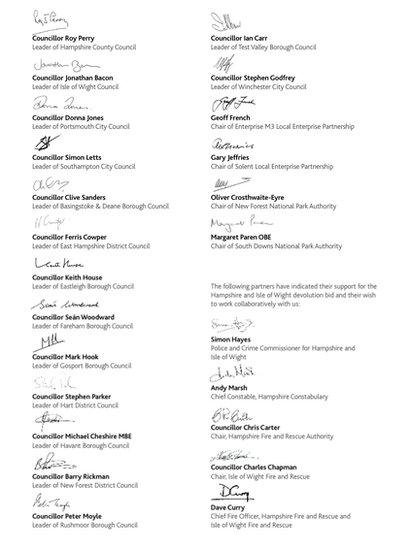Is Hampshire devolution doomed?
- Published
- comments
It all seemed to be going so well. Hampshire and Isle of Wight's bid for devolution was seen as a southern front-runner. An economy close to the scale of Wales bidding for control of its own destiny.
The architect of the plan, Hampshire leader Roy Perry, was singled out to speak at the Conservative Party conference in September and the Secretary of State Greg Clark seemed keen.
As deals were signed with the North East, then the South West, it seemed the Southern powerhouse was just around the corner.
But now I am told it will be January at the earliest before the plan will be looked at again.
After initial meetings Westminster enthusiasm appears to have cooled. And back on the south coast changes that were ordered aren't going down well, in particular the concentration on new housing, overriding local plans.
At least two of those who originally signed the original document have now tempered their commitment.
Glossy Prospectus
The glossy prospectus picked out the South of England's role as a driver of the UK economy, representing the largest "county area" economy in the UK, promising to add £3bn if productivity was raised.
An impressive 24 signatures backed the bid, Hampshire County Council, Isle of Wight Council, Portsmouth and Southampton city councils and 11 district councils.
They were working together on the project along with the Solent and Enterprise M3 Local Enterprise Partnerships, New Forest and South Downs National Park authorities, Hampshire Constabulary, Hampshire Fire and Rescue and NHS England Wessex.
But keeping the leaders of all those organisations marching in the same direction has proved difficult.

When the Leader of Hampshire County Council Roy Perry got top billing at a debate on devolution at the Conservative conference the call for 100% retention of business rates looked more distinctive than now that the chancellor has announced that was what he planned anyway.
One council leader, Ferris Cowper from East Hampshire then admitted he'd only signed the bid reluctantly saying: "If it proved possible to stay in the project for the time being, then we had a chance of influencing the outcome to be more in our favour.
"To remove ourselves from the bid at this early stage, would deny us that opportunity."
Hardly a ringing endorsement.
Then the Solent Local Enterprise Partnership sent a letter expressing some of its own reservations.
In November, Secretary of State Greg Clark cancelled a planned visit to the South, summoning representatives from the region to London instead.
A leader who was there described it as "a cross between Dragon's Den and the Apprentice".
So who got fired?
The government still wants to see an elected mayor at the helm of a new authority, so far the southern bid is offering just a board of leaders.
The bid puts accelerated housing delivery at the forefront of its offer in return for certainty over infra-structure funding.
But now several of the Conservative-led district councils are backing away from agreeing to vote-losing concreting over southern green fields.
Far from one streamlined new administration, it's looking increasingly like devolution may end in tears - or the same old tiers - of local government.